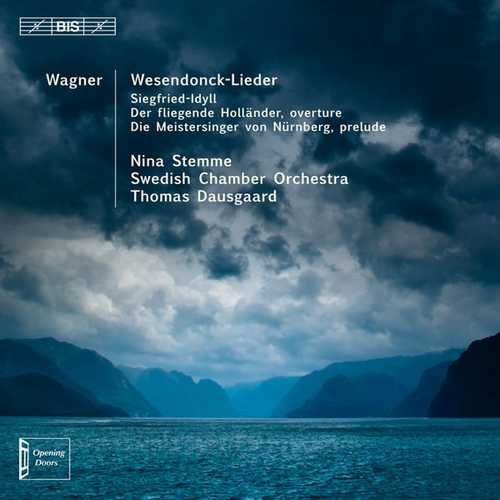
Composer: Richard Wagner
Performer: Nina Stemme
Orchestra: Swedish Chamber Orchestra
Conductor: Thomas Dausgaard
Format: FLAC (tracks)
Label: BIS
Release: 2013
Size: 786 MB
Recovery: +3%
Scan: yes
01. Der fliegende Hollander (The Flying Dutchman): Overture (1841 version)
Wesendonck-Lieder
02. No. 1. Der Engel (The Angel) (orch. F. Mottl)
03. No. 2. Stehe still (Stand Still) (orch. F. Mottl)
04. No. 3. Im Treibhaus (In the Hothouse) (orch. F. Mottl)
05. No. 4. Schmerzen (Pain) (orch. F. Mottl)
06. No. 5. Träume (Dreams) (orch. Wagner)
Der fliegende Holländer: Overture
07. Der fliegende Hollander (The Flying Dutchman): Overture (Final Version)
08. Siegfried Idyll
09. Wesendonck Lieder: No. 5. Träume (version for solo violin and chamber orchestra)
Die Meistersinger von Nürnberg
10. Die Meistersinger von Nurnberg (The Mastersingers of Nuremberg), Act I: Prelude
In June 2013 the Swedish Chamber Orchestra under the expert direction of Thomas Dausgaard are joined by one of today’s foremost Wagner singers. Named ‘Singer of the Year’ by Opernwelt magazine in 2012, Nina Stemme has been the Isolde of choice at Glyndebourne, Bayreuth and Covent Garden.
For this new release Nina performs the five Wesendonck-Lieder, of which two in particular, Im Treibhaus and Träume, were referred to by Wagner as ‘studies’ for Tristan and Isolde. Wagner himself prepared a version for violin and orchestra of Träume, and the ensemble includes this setting featuring principal violinist, Katarina Andreasson, as soloist.
The Wesendonck-Lieder are framed by two versions of the overture to Der fliegende Holländer, the rarely heard 1841 original version and the composer’s final creation from 1860, with its new ending inspired by Tristan, composed three years earlier.